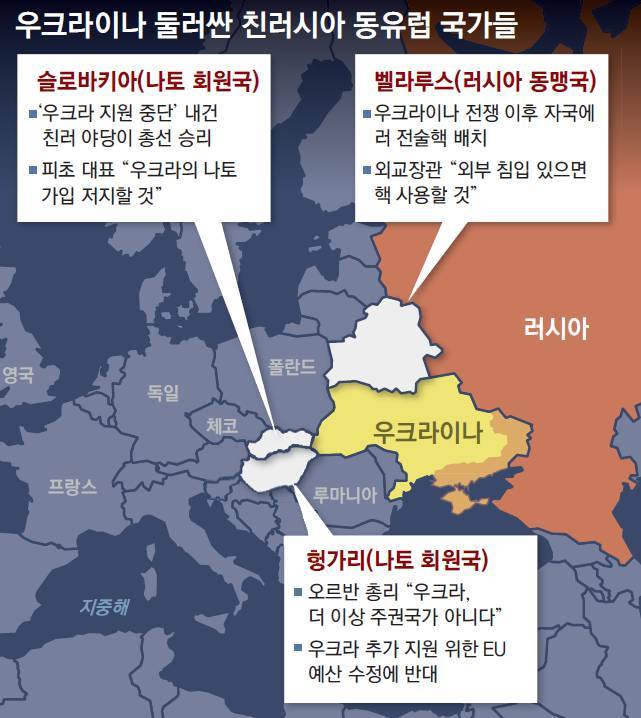“We will not send even a single ammunition to Ukraine.”
Slovakia expects policy changes in friendly forces
Agricultural disputes between Hungary and Poland
Fatigue from long-term war spreads among Eastern European neighbors
In the Slovak general election held on the 30th of last month, the pro-Russian left-wing opposition Smer Social Democratic Party (SD) took first place. Slovakia, a member of the North Atlantic Treaty Organization (NATO) and bordering Ukraine, was a strong ally of Ukraine. It also provided fighter jets the second fastest among NATO member countries. However, a change in Slovakia’s policy toward Ukraine is expected due to the victory of the Social Democratic Party in the general election, which advocated ‘opposition to military aid to Ukraine’. In addition, as fatigue over the prolongation of the war increases, especially in Eastern European countries such as Hungary and Poland, which are also NATO members, cracks are expected to appear in NATO’s support line for Ukraine.

According to foreign media such as the British daily Guardian on the 1st, the Slovak Social Democratic Party took first place in this general election with 22.94%. The right-wing ‘Progressive Slovakia’ ranked second with 17.96%, and Hlas, another left-wing party, ranked third with 14.7%. Former Prime Minister Robert Pitso (59), who leads the Social Democratic Party, met with reporters on the 1st after victory was confirmed and reaffirmed his position on suspending support to Ukraine, saying, “Slovakia has bigger problems than Ukraine, such as skyrocketing energy and living costs.”
Former Prime Minister Picho emphasized during his campaign that “we will not send a single round of ammunition to Ukraine.” He also effectively placed responsibility for the war on Ukraine, saying, “Ukrainian Nazis and fascists started killing Russians and the war started.” This is a repeat of the reasons for invading Ukraine that Russian President Vladimir Putin has claimed.
Former Prime Minister Picho also opposed Ukraine’s accession to NATO. In a March poll by Slovak think tank GlobeSec, 51% of Slovak respondents said the West and Ukraine were responsible for the war in Ukraine. The New York Times (NYT) analyzed, “The results of this election are due to growing dissatisfaction with the billions of dollars in military aid provided to Ukraine over the past 19 months and the growing public demand to spend the budget on urgent domestic issues.” However, as no party could secure a majority of seats (76 seats) in this general election, the Social Democratic Party must form a coalition government.
Skepticism about support for Ukraine is spreading mainly in Eastern Europe, which borders Ukraine, including Hungary and Poland. This is because the prolonged war took a heavy toll on this region, which has a relatively weaker economic structure than Western Europe, and a dispute over the import of agricultural products recently broke out.
In Poland and Hungary, as agricultural products from Ukraine flowed into their countries after the war, the prices of wheat and sunflower seed oil fell, leading to growing opposition from farmers. After the outbreak of war, Ukraine increased exports to neighboring countries such as Poland, Hungary, and Slovakia through land routes as Black Sea ports, the main grain export route, were closed.
In May, the European Union allowed Bulgaria, Hungary, Poland, Romania and Slovakia to restrict imports of agricultural products from Ukraine. However, the conflict grew as this measure was lifted last month, claiming that market distortions had disappeared. Poland, Hungary, and Slovakia announced their intention to maintain an ‘import ban’, and Ukraine filed a complaint against these three countries to the World Trade Organization (WTO). Amid this conflict, Poland responded that it would not transfer weapons to Ukraine, and Hungary also objected. Hungarian Prime Minister Viktor Orbán, a representative anti-Ukrainian figure, sent a message to former Prime Minister Pitso, who won the Slovakian general election, via “I’m looking forward to it,” he said.
CNN predicted, “As the front line becomes more stalemate, the West’s will to support Ukraine will be tested.” The Financial Times (FT) said, “(Former Prime Minister Pitso) will join Prime Minister Orbán in raising another anti-Ukrainian voice in Europe.”
Source: Donga
Mark Jones is a world traveler and journalist for News Rebeat. With a curious mind and a love of adventure, Mark brings a unique perspective to the latest global events and provides in-depth and thought-provoking coverage of the world at large.